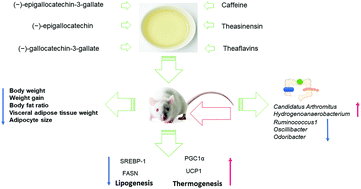Oolong tea extract alleviates weight gain in high-fat diet-induced obese rats by regulating lipid metabolism and modulating gut microbiota†
Abstract
Obesity is a serious global health issue, and the societal interventions during the COVID-19 pandemic may have perturbed energy homeostasis, which affects the condition of obesity. Tea is a traditional beverage in Asia and has been shown to provide many beneficial health effects. Oolong tea is semifermented, with its chemical composition comprising features of green (unfermented) and black (fermented) tea. Although green tea has anti-obesity properties, studies on the anti-obesity ability of oolong tea are still scarce. In this study, we analyzed the chemical composition of oolong tea extract (OTE) and investigated the effects of OTE on high-fat diet-induced obese rats. OTE contained more (−)-epigallocatechin-3-gallate, (−)-epigallocatechin, and (−)-gallocatechin-3-gallate than theaflavins and theasinensins. Rats fed with a high-fat diet (HFD) and treated with 0.5% OTE exhibited significantly reduced body weight and visceral fat weight compared with the HFD-only group. OTE also decreased adipocyte size, lipogenesis-related protein sterol regulatory element-binding protein 1 (SREBP1) and fatty acid synthase (FASN) protein expression and increased thermogenesis-related protein peroxisome proliferator-activated receptor gamma coactivator 1-alpha (PGC1α) and uncoupling protein 1 (UCP1) protein expression in epididymal adipose tissue compared with the HFD group. Moreover, the OTE groups had a significantly higher abundance of Candidatus arthromitus and Hydrogenoanaerobacterium and a lower abundance of Ruminococcus1, Oscillibacter, and Odoribacter compared with the HFD group. All these results show that OTE can alleviate weight gain by regulating lipid metabolism and modulating the distribution of the gut microbiota to decrease lipid accumulation in adipose tissue.



 Please wait while we load your content...
Please wait while we load your content...